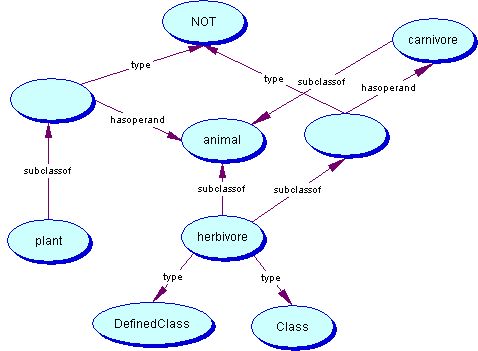- From: Tom Van Eetvelde <tom.van_eetvelde@alcatel.be>
- Date: Tue, 10 Oct 2000 18:19:35 +0200
- To: Graham Klyne <GK@Dial.pipex.com>
- CC: "McBride, Brian" <bwm@hplb.hpl.hp.com>, Jeen Broekstra <jbroeks@cs.vu.nl>, www-rdf-interest@w3.org
- Message-ID: <39E34197.9D4D27D6@alcatel.be>
Hello Brian, I sympathise with your uncomfy feeling about the OIL example in Jeen's text. The logical operators seem to lead to reasoning errors if you ask me. I took a graphical snapshot of the herbivores, the carnivores and the plants. I wonder about the computability of these logical constructs. I am going to formulate some questions about the model and one has to try to come to a generic algorithm to answer all these questions. I cannot see how a computer is going to walk through this graph to find the correct answers. Maybe it's just the example that needs corrections, or do I touch some core issues here? A quick recap on negations: set A subset of set B x element of set A => x element of set B X no element of set B => x no element of set A Questions ---------- 1) Is a plant no carnivore? If you walk through the graph, you get: plant belongs to NOT animal, and therefore to NOT carnivore (carnivore subset of animal). So the answer is yes. This means that the computer places herbivores and plants on the same 'level'. 'NOT carnivores' eat plants. Therefore, plants eat plants and herbivores eat plants. What is missing here is the fact that herbivores are animals and plants are not. So in fact, the machine should produce an alert: the answer is yes but ... How is the machine going to know what is more important as criterion to answer the question?. 2) Actually, one should draw an arc 'subclassof' from 'Not carnivore' to animal as the 'NOT' only has meaning with respect to the animal domain. Unfortunately, conflicts again: plant is no animal, therefore it doesn't belong to 'carnivore' and 'no carnivore'. This means that plant is either no carnivore or no NOT carnivore = carnivore. Oooppps...... I hope someone can clear this out for me. regards, Tom.
Attachments
- image/jpeg attachment: herbivoreview.jpg

Received on Tuesday, 10 October 2000 12:25:12 UTC